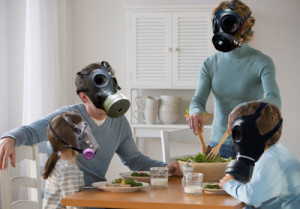 It’s a fact that many homes appear sparking clean internally and externally, but they can carry some not-so-nice odors which can be quite a put-off. So how do you determine the air quality within your home? By asking yourself some questions.
It’s a fact that many homes appear sparking clean internally and externally, but they can carry some not-so-nice odors which can be quite a put-off. So how do you determine the air quality within your home? By asking yourself some questions.
Do your rooms have a musty smell or is there some moisture on the insides of window panes? Do flat surfaces have excessive dust or is mold visible on shoes, books, or other things? Does a family member suffer from bouts of sneezing? If the answer is yes, there’s a strong probability of poor quality air in your home.
Indoor air pollution is a major health concern and can result in allergies, asthma, and other chemical sensitivities. A few basic strategies can help improve indoor air quality in a big way:
Find the source
There could be many sources of indoor air pollution:
- Secondhand smoke can cause air pollution and pose a serious health issue. Ensure that nobody smokes indoors.
- Many household cleaning agents, glues, and paints etc. emit vapors. Take care that they are used only in well ventilated areas. As far as possible, store them outdoors. Using naturally made products or those with low-VOC (volatile organic compound) is a good idea.
- Clean out dry cleaned stuff that strongly smells of chemicals outdoors before getting it indoors.
- Air out carpet material likely to have VOC emissions for a couple of days. Even after installation, keep windows open and put on a fan for adequate ventilation.
- Do not keep your car idling at a place from where fumes can enter your home.
- Clean up regularly. Wash linen in hot water. Take rugs outdoors for shaking. Cleaning hard surfaces with products such as white vinegar or baking soda is a good move. Using a “magnetic” duster will prevent dust particles entering the air. Keep outdoor shoes outside.
- High humidity levels can cause mold to grow. Use a hygrometer to measure humidity levels in your home. You can run a dehumidifier to remove excess humidity. Air conditioners also help in keeping humidity at bay. Fixing leaks and drips can help curb mold growth.
Purify the air
For keeping the indoor air quality high, a clean air filter for the cooling and heating system is a must. An allergen filter is also a good idea. Cleaning or changing filters every month will give you clean air and also extend your system’s life.
Ensure that bathroom, kitchen, and dryer vents are clean and operate properly. If you install an air filtration system for your entire home, you’ll get clean and pure air while your home is cooling or heating. Cleaning out all air ducts works wonders for indoor air quality. Since this also eliminates mold growth in the ducts, the efficiency of the HVAC system will improve.
Ventilate
Tight construction these days often results in poor air quality indoors. Whenever possible, try to keep doors and windows open. Use fans indoors to get the stale air to move out and fresh air to come in. Use the exhaust fans in your bath and kitchen regularly. For better air circulation, try to keep doors between rooms ajar as far as possible. Pay special attention to the ventilation of areas you use for hobby or maintenance work.
Home Loan Advisor can analyze your property, current market conditions, local market comps, and other variables in our proprietary algorithm as well as match you with potential lenders! To assist you in the refinancing process, you can get a free home value report from Neighborhood IQ and find out what your home is really worth.
